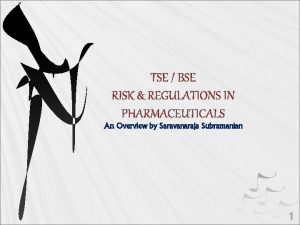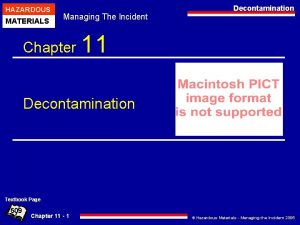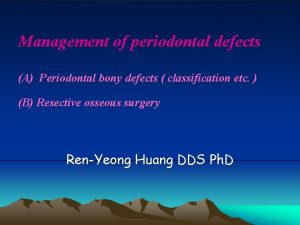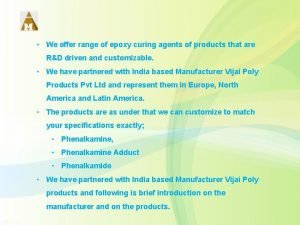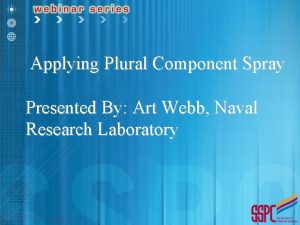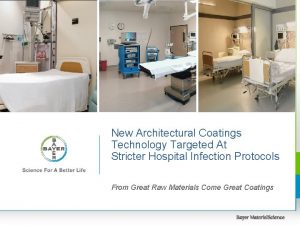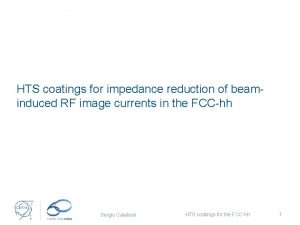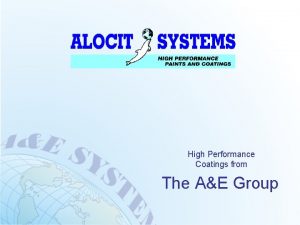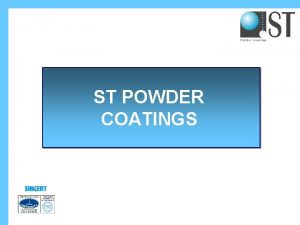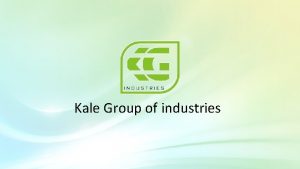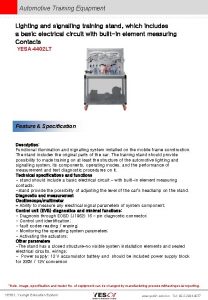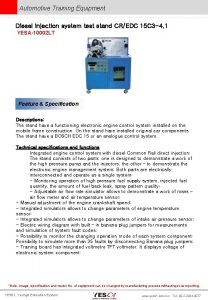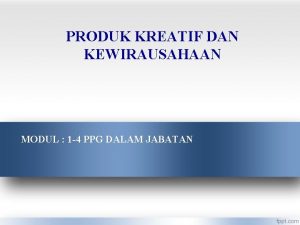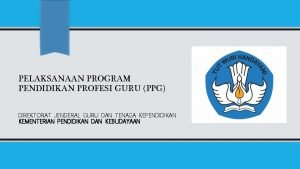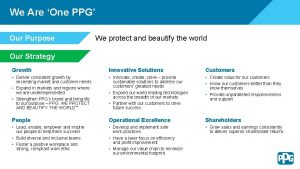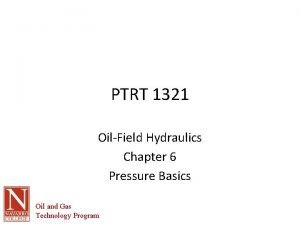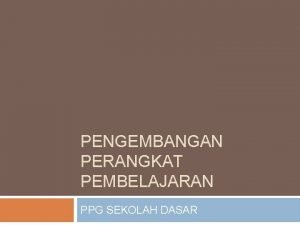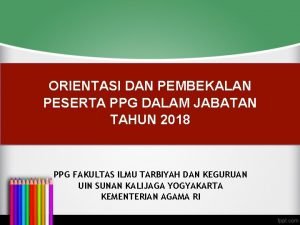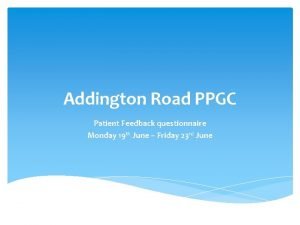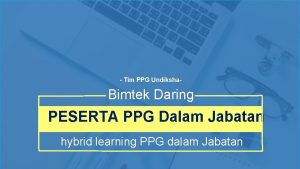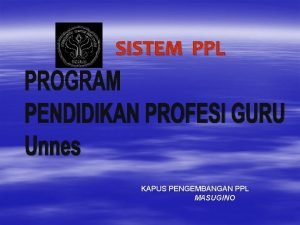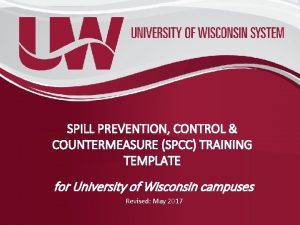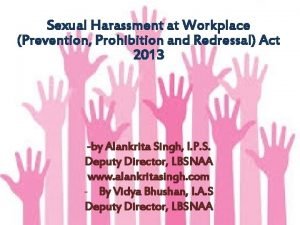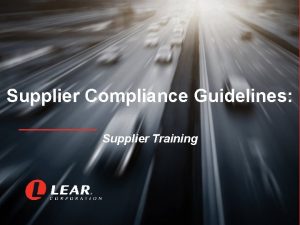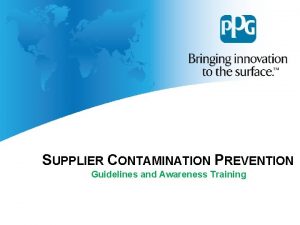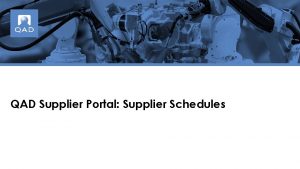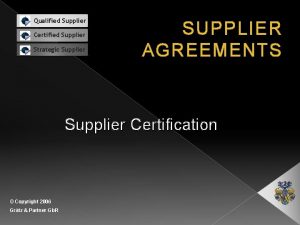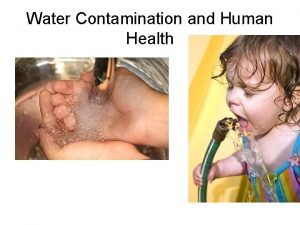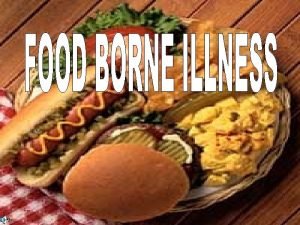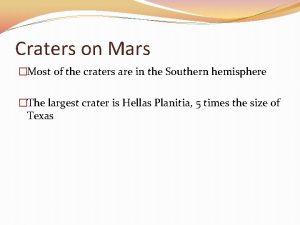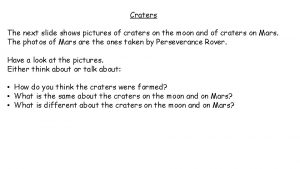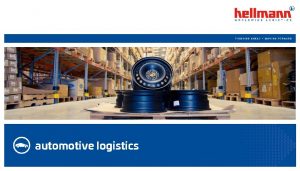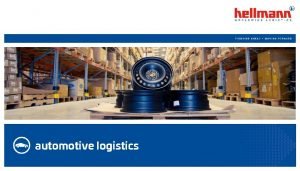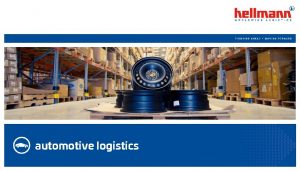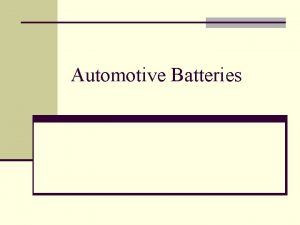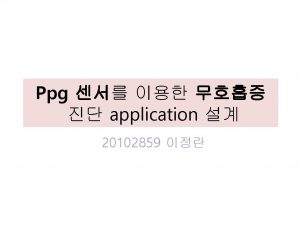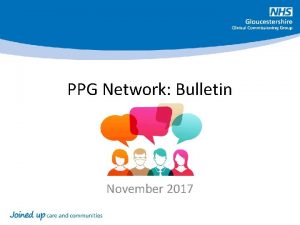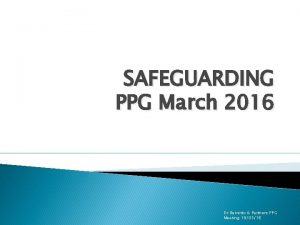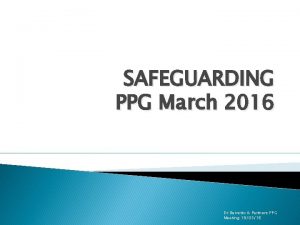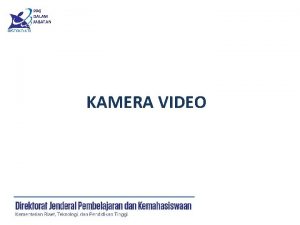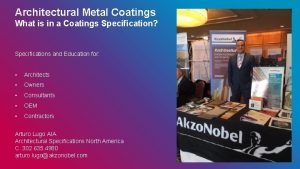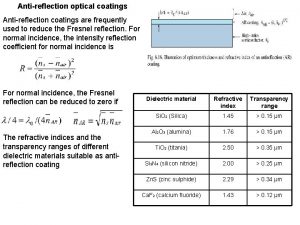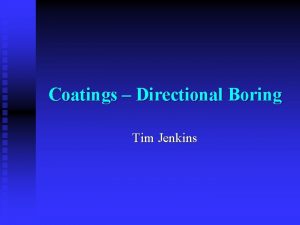PPG Automotive Coatings Supplier Contamination Prevention Training Craters
































- Slides: 32

PPG Automotive Coatings Supplier Contamination Prevention Training Craters and Dirt January 2019

Supplier Contamination Prevention Training Objectives: § Describe defects in paint caused by contamination § Help suppliers understand the impact of contamination for PPG and its customers § Highlight areas of risk in raw material manufacturing and packaging industries § Outline the care that must be taken to reduce the risk of contamination in our supply chain 2

Supplier Contamination Prevention Training Contamination that causes defects in our paint § Dirt, debris, rust, particulate § Gels or Seeds § Low surface tension contaminants that cause craters in our paint - Cross-contamination from a prior batch - Foreign contamination from maintenance materials, cleaning products, etc. For several investigations related to contamination, the root cause was traced to the raw material, packaging or bulk transport 3

SUPPLIER CONTAMINATION PREVENTION TRAINING What happens if our paint is contaminated? § Defects will appear on the paint when the vehicles are painted § PPG’s customer will need to repair the defects § If the defect rate is too high, the entire line will be shut down and employees will be sent home § The cost of running an automotive line is approximately $1, 000 USD per hour An automotive paint line

Supplier Contamination Prevention Training What risks can be present at a supplier facility? Contamination risk is increased in the following ways: § Insufficient oversight for bulk transport – incorrect wagon selected and/or inadequate cleaning § Cross contamination during material processing in non-dedicated equipment – inadequate cleaning between products and/or insufficient scheduling guidelines § Releasing excessive dirt in close proximity to processing vessels – dirty raw material containers, poor housekeeping and vessels not closed § Contaminating non-silicone batches with silicone containing additives § Use of equipment that has not been cleaned properly – tank, pump, hoses, 5 stingers, funnels, etc.

Supplier Contamination Prevention Training What risks can be present at a supplier facility? Contamination risk is increased in the following ways: § Improper storage of FG containers – pails, drums, totes § Insufficient controls for temperature sensitive materials – e. g. allowing water based product to freeze § Use of crater causing maintenance materials close to the production area § Use of new or repaired equipment, gaskets, etc. without prior cleaning and testing § Use of recycled drums in process or for packaging goods sent to PPG § Employees wearing contaminated clothing, gloves, boots or skin while working close to the production area 6

Supplier Contamination Prevention Training Dirt, debris, rust, particulate § If there are particles or seeds in the paint, the customer will have to sand the vehicles or reject them all together § Types of issues § Dirt/debris from environment and/or tops of containers § Rust from solvent pipes or storage tanks § Cellulosic fibers – from cotton mops, rags, cardboard, wood § Dried paint, tint paste or resin § Gels/seeds that formed – resin was filtered adequately and/or cross contamination has occurred § Metal – grinding operations where there are fine metallic particles in steel drum or pail manufacturing 7

Supplier Contamination Prevention Training Dirt, debris, rust, particulate § Housekeeping is key to keeping environmental dirt to a minimum § Ensure that dirt from raw material containers does not fall into product vessels or finished goods containers § Keep vessels covered while mixing and filling § Cover equipment adequately before maintenance work is performed in the area (especially overhead) § Where possible – keep doors closed 8

Supplier Contamination Prevention Training Craters are dish shape deformations in a paint surface caused by the presence of a contaminant. It is also called a ‘fish eye’. The difference in surface tension of the contaminant and the surface tension of the coating causes the paint to ‘crawl’ away from the contaminant. The film thickness at the crater site is below specification and the appearance is unacceptable to PPG’s customers.

Supplier Contamination Prevention Training What do we mean by surface tension? The attractive force exerted upon the surface molecules of a liquid by the molecules beneath that tends to draw the surface molecules into the bulk of the liquid and makes the liquid assume the shape having the least surface area.

Supplier Contamination Prevention Training Crater contamination at a customer’s site § The presence of low surface tension contaminants in the paint causes craters § Even very small quantities of the contaminant (less than 0. 001%) can cause craters The crater defect can show up on PPG’s customer’s line in the flash or the bake stages of the process 11 The paint has crawled away from the tiny droplet of contaminant to form a crater Magnification of a crater defect on a vehicle

Supplier Contamination Prevention Training Bulk Shipments to PPG Automotive Coatings & Resin Sites § Numerous contamination events were traced to the road tanker or tank wagon used to transport the material § Numerous road tankers carrying raw materials to a PPG automotive resin or coatings site have been rejected because the sample did not pass the contamination tests § For suppliers arranging bulk transport for delivery to PPG, strong oversight is needed to ensure compliance to requirements 12

Supplier Contamination Prevention Training Road Tankers/Tanks Wagons delivering solvents to PPG § Sampling devices for checking solvent cleanliness § Solvent dedicated wagons are recommended where possible § If the wagon is NOT dedicated, then wagon selection based on prior content is critical § A solvent wagon prior load MUST be another solvent These are examples of devices that PPG has fabricated to allow sampling from the bottom valve of the wagon. Approximately 20 liters of The wagon will be solvent are drawn through a rejected if there are gels filter device to check for dirt, or excessive dirt debris and gels. 13

Supplier Contamination Prevention Training Approved Solvent Classifications Solvent prior loads for solvents Acetates Glycol Ether Alcohols Glycol Ether Esters Aliphatics Ketones Aromatics Mineral Spirits Esters Naptha Ethylene Glycol Any questions/concerns – contact the PPG Quality Manager at the receiving site 14

Supplier Contamination Prevention Training Tank Wagons/Road Tankers Delivering Non-Solvents § Dedicated wagons are recommended where possible § If the wagon is NOT dedicated, then wagon selection based on prior content is critical § Use of a reliable cleaning station is also key § PPG’s Prohibited Prior Contents list must be adhered to when selecting the wagon 15 - Oils & Greases - Materials with Low Surface Tension Additives - Strong Acids & Bases - Powders & Colorants

Supplier Contamination Prevention Training Prohibited Wagon Prior Contents Any questions/concerns – contact the PPG Quality Manager at the receiving site Oils & Greases Lubricating Oils Machine Oils Silicone Greases Silicones Waxes Vegetable Oils Perfluoropolyethers Materials with Low Surface Tension Additives Silicone bases additives Fluorocarbons Defoamers Acrylic emulsion Adhesion Promoter Fluorine based additives Cleaning Compounds Detergents Dispersants Refrigerants Release Agents Surfactants Sulfuric Potassium Hydroxide Sodium Hydroxide Dye Dispersions Dry Powders Strong Acids & Bases Hydrochloric Perchloric Powders & Colorants Pigments 16

Supplier Contamination Prevention Training Sources of Foreign Contamination from Bulk Transport § Inadequate cleaning § § Prior contents residue remaining Residual caustic or detergent from inadequate rinsing Contaminants from maintenance performed on the interior ‘barrel’ New valve or other parts installed without pre-cleaning § Prohibited maintenance materials used § § § Silicone greases Perfluoropolyethers (PFPE) type lubricants Lubricants with low surface tension additives § Contaminated hoses and/or couplings used for off-loading material § 17 Cross contamination from previous material in transfer hose/couplings

Supplier Contamination Prevention Training Example Causes of Poor Road Tanker Cleaning § Spray system for interior inadequate – design and/or pressure used § Caustic tank contaminated or low strength § Ineffective rinsing – caustic or detergent residue § Temperatures not well controlled for steam and water flushes § Drying process allows environmental dirt § Valves not cleaned correctly, residue from prior loads on gaskets § Cleaning after interior maintenance ineffective at removing contaminants § Inspection criteria is not well defined and does not align with PPG’s requirements 18

Supplier Contamination Prevention Training Containers § All container types must be approved before use § Tote cleaners, drum & pail manufacturers are audited on a regular basis § All packaging (drums, pails, plastic IBC’s, totes) must be delivered to PPG free of contamination § Use of recycled drums anywhere in the supplier’s process related to PPG automotive products is strictly prohibited 19

Supplier Contamination Prevention Training Silicone Handling § If silicone containing materials are used on site, ensure that appropriate procedures are in place to prevent inadvertent cross contamination § Separate tools and storage are recommended Dedicated tools and storage areas are also used at PPG Pink labeling is used as a visual aid at PPG Automotive plants 20

Supplier Contamination Prevention Training PPG’s Global Materials Registration List (MRL) § Over 4000 maintenance materials and consumables (filters, etc. ) have been tested in PPG labs – results are tracked on PPG’s Global Materials Registration List (MRL) 21

Supplier Contamination Prevention Training Maintenance Material Controls - Crater Testing § Some of PPG’s suppliers have the capability of testing materials for craters – contact PPG if interested in acquiring this capability § For some critical processes at a supplier site, PPG will crater test materials 22 - Contact the PPG receiving plant to check if testing can be done - Open the Global MRL and find the tab with the Request Form - Ensure that material samples sent are in pristine condition to prevent a false result

Supplier Contamination Prevention Training Maintenance Material Controls - Supplier Site List § Each supplier sites should develop its own internal list of materials that can be used in PPG related processes § Some maintenance materials fail crater testing, but are needed. These can have restricted use, away from product processes § Use of visual aids are recommended – e. g. approved stickers 23

Supplier Contamination Prevention Training Maintenance Material Controls IT’S NOT JUST SILICONES that can cause craters! § Any material that has a low surface tension can pose a risk to our paints § High temperature greases with ‘fluorine’ content § Other common lubricants and products Many popular products cause craters! High temperature lubricants frequently contain PTFE, a fluorine based chemical that causes SEVERE craters at very low levels! 24

Supplier Contamination Prevention Training Maintenance and Production Process Controls All gaskets must be rinsed before use in production Any new or repaired process equipment can be contaminated Pre-cleaning must be done prior to use 25 All new valves that will be in direct contact with PPG related materials must be pre-cleaned

Supplier Contamination Prevention Training Equipment Cleaning § Cross-contamination – when small amounts of material from a previous batch cause craters § Dedicated equipment is ideal, but not always possible § Ensure that equipment is cleaned thoroughly between batches – tanks, pumps, hoses, stingers, etc. 26

People Stuff Supplier Contamination Prevention Training Work Wear § Heavily soiled clothing, gloves, boots should be changed Personal Care Products § Many personal care/grooming products cause craters - avoid use of excessive amounts of hair gels, sprays, lotions, etc. § Use SILICONE FREE SBS-40 provided 27

People Stuff Supplier Contamination Prevention Training Food § Many foods contain oils, greases, additives that can cause craters § Washing hands before meals is required for safety reasons § Washing hands after meals as well to prevent contamination in PPG related products is recommended 28

Supplier Contamination Prevention Training Summary Contamination prevention measures needed by supplier: § Housekeeping is key to minimizing dirt levels § Strong oversight is needed for bulk transport § Packaging must be free of contamination § If using silicones, measures must be in place to prevent crosscontamination § Each site should have an internal list of approve maintenance materials and consumables (refer to PPG’s MRL for test results) 29

Supplier Contamination Prevention Training Summary Contamination prevention measures needed by supplier: § All new or repaired equipment and parts in direct contact with PPG related materials must be pre-cleaned before putting in service § For non-dedicated processing vessels, mills, piping, pumps, etc. , thorough cleaning is required between batches of different products to prevent cross-contamination § Minimize contamination risk with personnel awareness and policies – work wear, personal care products, food in the workplace 30

Supplier Contamination Prevention Training How to access the PPG Automotive Coatings documents Search “PPG Supplier Network” Once on the PPG Supplier Network, scroll down to Information Links Documents 6, 7 & 8 are posted by PPG Automotive Coatings for suppliers 31

 Tse bse guidelines
Tse bse guidelines Contamination vs cross contamination
Contamination vs cross contamination Primary prevention secondary prevention tertiary prevention
Primary prevention secondary prevention tertiary prevention Mercurys craters
Mercurys craters Venus craters
Venus craters Positive architecture perio
Positive architecture perio Markskill llc
Markskill llc Plural component spray gun
Plural component spray gun Hospital wall coatings
Hospital wall coatings Hts coatings
Hts coatings Pinnacle coatings group
Pinnacle coatings group Powder coating kildare
Powder coating kildare Alpit metal works
Alpit metal works St powder coatings
St powder coatings Sherwin williams chemical coatings store
Sherwin williams chemical coatings store Automotive training stands
Automotive training stands Teststand training
Teststand training Modul ppg prakarya dan kewirausahaan
Modul ppg prakarya dan kewirausahaan Banpem ppg
Banpem ppg One ppg recognition & rewards
One ppg recognition & rewards Convert pcf to ppg
Convert pcf to ppg Ppg examples for educator effectiveness
Ppg examples for educator effectiveness Karya inovatif
Karya inovatif Suryanti unesa
Suryanti unesa Pengembangan perangkat pembelajaran daring ppg
Pengembangan perangkat pembelajaran daring ppg Resume orientasi ppg
Resume orientasi ppg Open space ppg
Open space ppg Ppg programme
Ppg programme Ppg adstock
Ppg adstock Ppg undiksha
Ppg undiksha Guru pamong ppg
Guru pamong ppg Spill response steps
Spill response steps Sexual harrasment prevention training
Sexual harrasment prevention training
